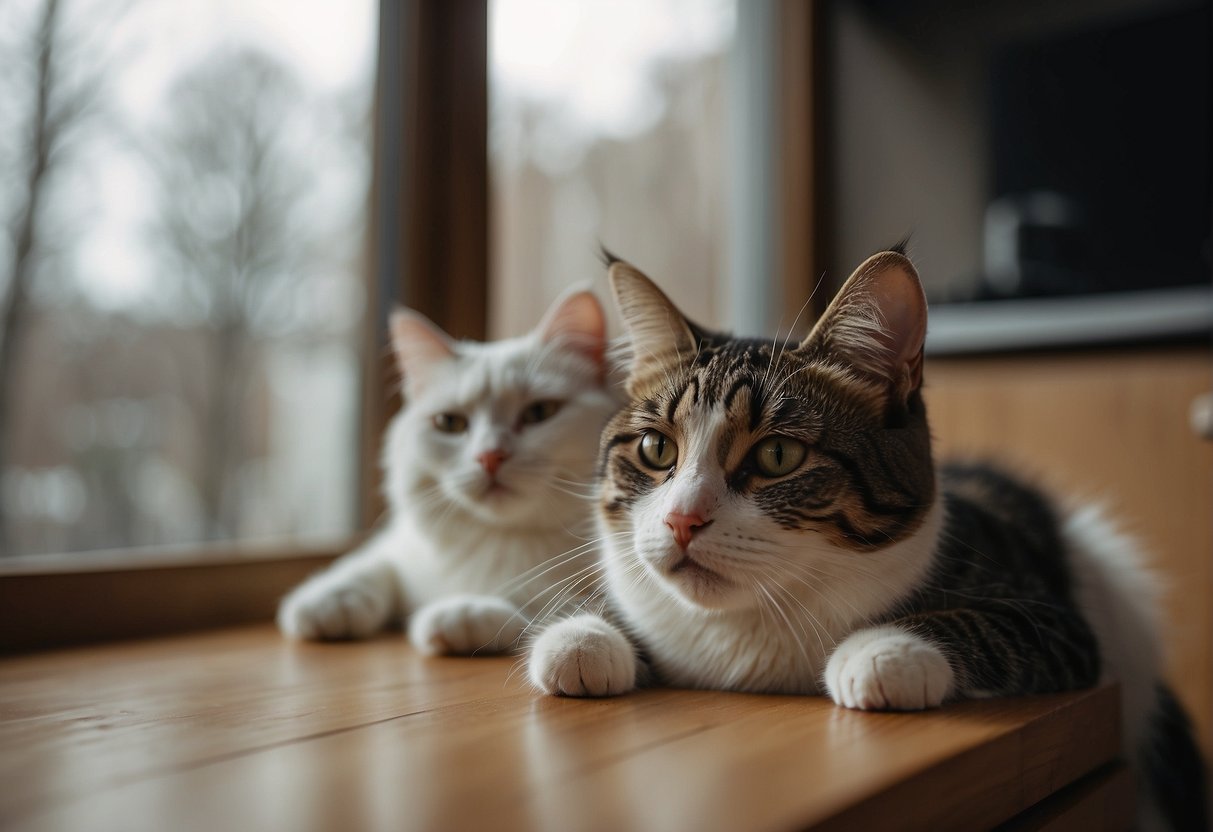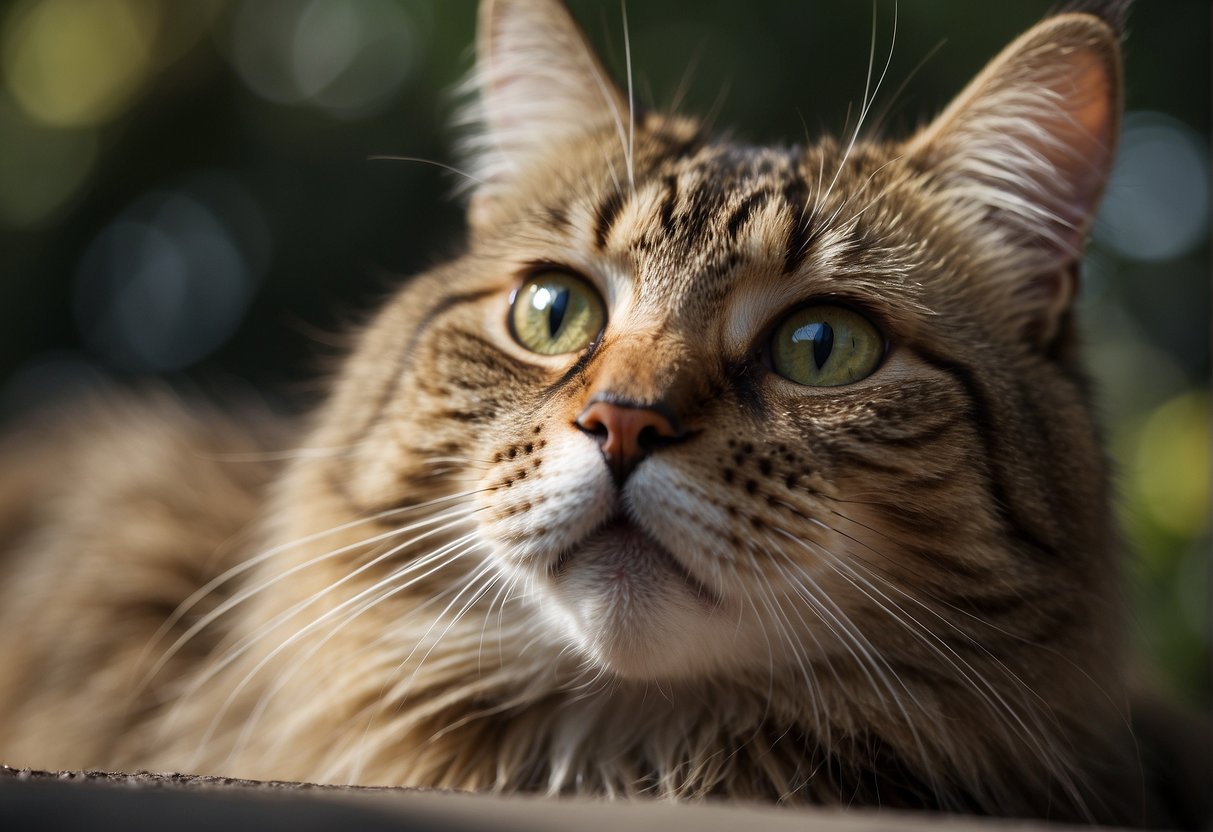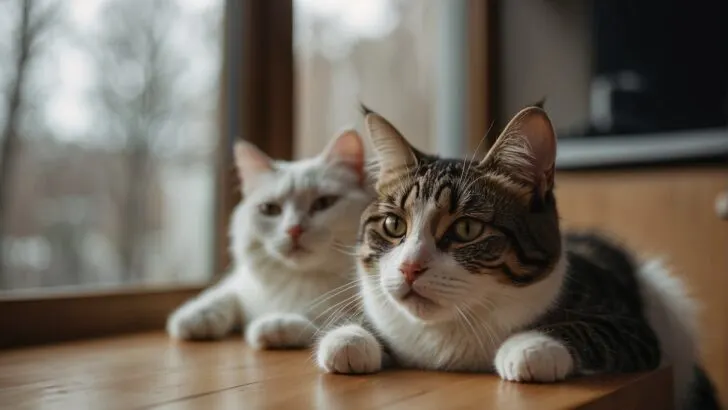Just like their human companions, cats can catch colds, which are upper respiratory infections typically caused by viruses. In your feline friend’s case, the culprits are often the feline herpesvirus and feline calicivirus, both highly contagious and prevalent in environments with multiple cats.
Remember the time when your little buddy started sneezing frequently, or you noticed them with a runny nose and watery, irritated eyes? Those are classic symptoms indicating that your cat might be having a cold.

As a cat owner, you should be on the lookout for symptoms like persistent sneezing, congestion, or a change in appetite—tell-tale signs that your cat is under the weather. It’s important to note that stress or changes in the environment can lower their immune defenses, making them more susceptible to viruses that cause colds.
Although not as common, bacteria can also be a secondary cause of these symptoms, complicating your cat’s recovery.
If you do suspect your cat has caught a cold, it’s best to provide a warm, comfortable space and ensure they remain hydrated. While a cat’s built-in fur coat offers some protection against the cold, they certainly appreciate a cozy spot away from drafts when they’re feeling unwell.
If symptoms persist or worsen, it’s always a good idea to consult your veterinarian to rule out more severe conditions and to discuss whether any specific treatment is necessary for your pet’s recovery.
Understanding Cat Colds

When you notice your feline friend is sneezing more than usual or has a runny nose, it might be a case of the common cat cold.
Common Cold Viruses in Cats
Two primary viruses are associated with cat colds: feline herpesvirus (FHV) and feline calicivirus (FCV). These are the most common viral causes of upper respiratory infections in cats. While each virus has its own set of symptoms, they often overlap.
- Feline Herpesvirus (FHV): Causes moderate to severe upper respiratory issues.
- Feline Calicivirus (FCV): Often leads to milder respiratory signs but can cause painful ulcers in the mouth.
Transmission and Contagious Nature
Cat colds are highly contagious among cats, especially in places with high feline populations, like shelters or catteries. Transmission can occur through:
- Direct contact with infected cats (nose-to-nose contact)
- Airborne spread, particularly from sneezing
- Contaminated objects (bowls, litter boxes, human hands)
If I were you, I’d isolate an infected cat to prevent the virus from spreading to others, particularly if you own multiple pets.
Symptoms and Diagnosis
The symptoms of cat colds can vary. Here are some signs to look out for:
- Sneezing
- Nasal discharge
- Red and irritated eyes
- Reduced appetite
If you suspect your cat has a cold, a veterinarian can conduct diagnostic tests to determine the specific virus. These tests help ensure your cat receives the appropriate care and treatment, which is crucial for their recovery.
Treatment and Management
When your cat is under the weather with a cold, prompt treatment and management are crucial to help them recover swiftly. It’s important to balance professional veterinary care with home care approaches, making sure your furry friend receives the best support to bounce back to their playful self.
Professional Veterinary Care
If you notice signs of an upper respiratory infection—such as persistent sneezing, coughing, or discharge from the eyes or nose—it’s time to visit the veterinarian.
They’ll provide a proper diagnosis and may prescribe antibiotics if a bacterial infection is present, though antibiotics won’t help viral infections. Supportive care could also be recommended, which may include anti-inflammatory medications or other treatments specific to your cat’s condition.
Home Care Approaches
At home, your focus should be on making your cat comfortable and assisting their immune system in fighting off the infection.
- Humidity: Using a humidifier can help ease your cat’s breathing by adding moisture to the air. Even sitting with your cat in a steamy bathroom for short periods can make a difference.
- Home remedies: While many home remedies for humans are not safe for cats, keeping them hydrated and providing a warm blanket are simple measures that significantly help.
- Supportive care: Offer your cat easy-to-digest food and ensure they have a quiet, stress-free space to rest and recover.
Remember, while you provide home care, keep a close watch on your cat’s progress and consult with your veterinarian if symptoms persist or worsen.
Prevention and Vaccination
When it comes to keeping your feline friend healthy, prevention is key. Vaccinations play a crucial role in ensuring your cat’s immune system can ward off common illnesses like the cat cold.
Importance of Vaccines
Vaccinations are essential for enhancing your cat’s immune system against infectious diseases that affect both indoor and outdoor cats. Here’s a snapshot of how vaccines contribute to your cat’s health:
- For indoor cats: While they may be less exposed to viruses, they aren’t completely isolated from pathogens that could be brought in from outside, whether through human contact or other pets.
- For outdoor cats: The exposure to other cats or environments increases the risk of contracting various infections. Vaccinations are crucial in offering a protective shield against these risks.
Vaccines work by introducing a safe version of the virus to your cat’s immune system, which then builds up defenses and “learns” how to fight the real virus should exposure occur.
The core vaccines for cats include:
- Feline herpesvirus
- Feline calicivirus
- Feline panleukopenia virus
These vaccines are often administered together in a combination vaccine, frequently referred to as the “FVRCP” vaccine.
Vaccination schedules vary, and they often start when kittens are around 6-8 weeks old, with boosters given every few weeks until they are about 16 weeks old. After the initial series of vaccinations, your cat will typically require boosters every 1-3 years, depending on the specific vaccine, to maintain their immunity.
Remember, the specific vaccination needs and schedules can differ based on a number of factors including age, health, and lifestyle.

My name is James, and welcome to FAQCats!
Along with our team of cat owners, expert pet enthusiasts, and pet professionals, we aim to write engaging helpful, engaging content about cats. At FAQCats we strive to provide content that’s accurate and fun to read. Our team writes about everything related to cats; even the most complex of topics. Through extensive research and caring for our own fur-pals, we’re able to provide something cat owners worldwide will love. Have a look around, and leave us feedback anytime!

